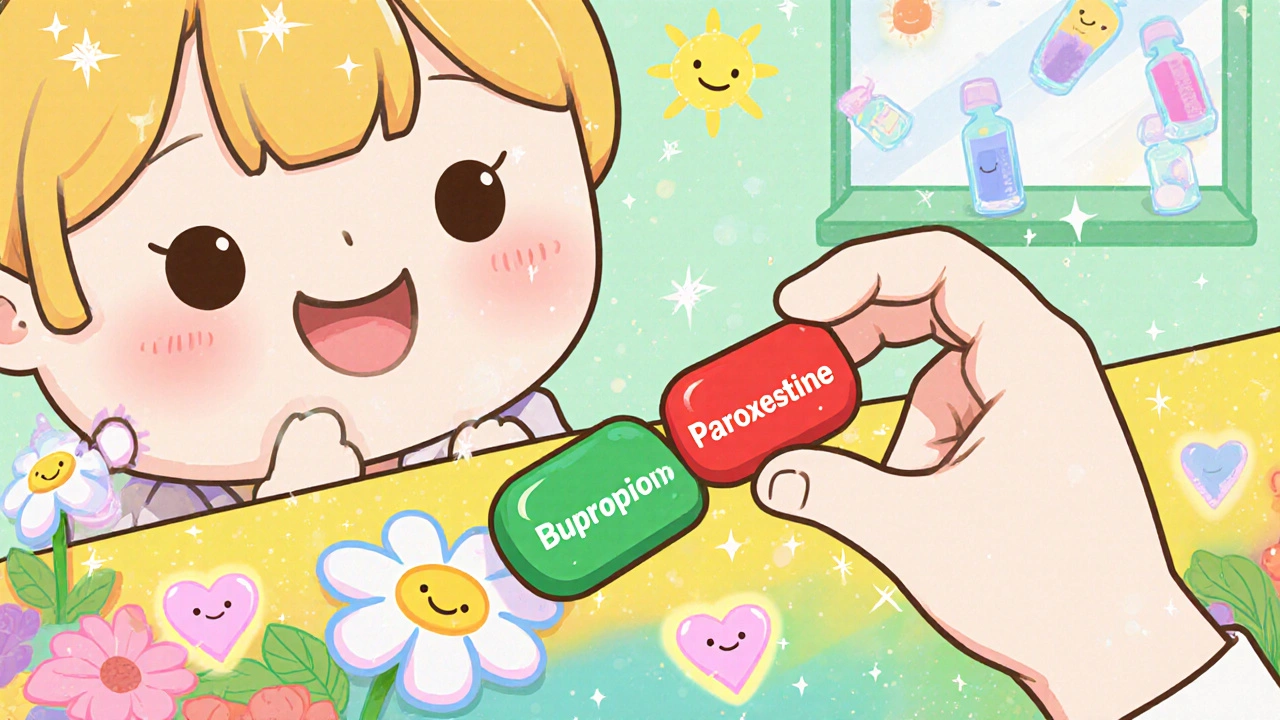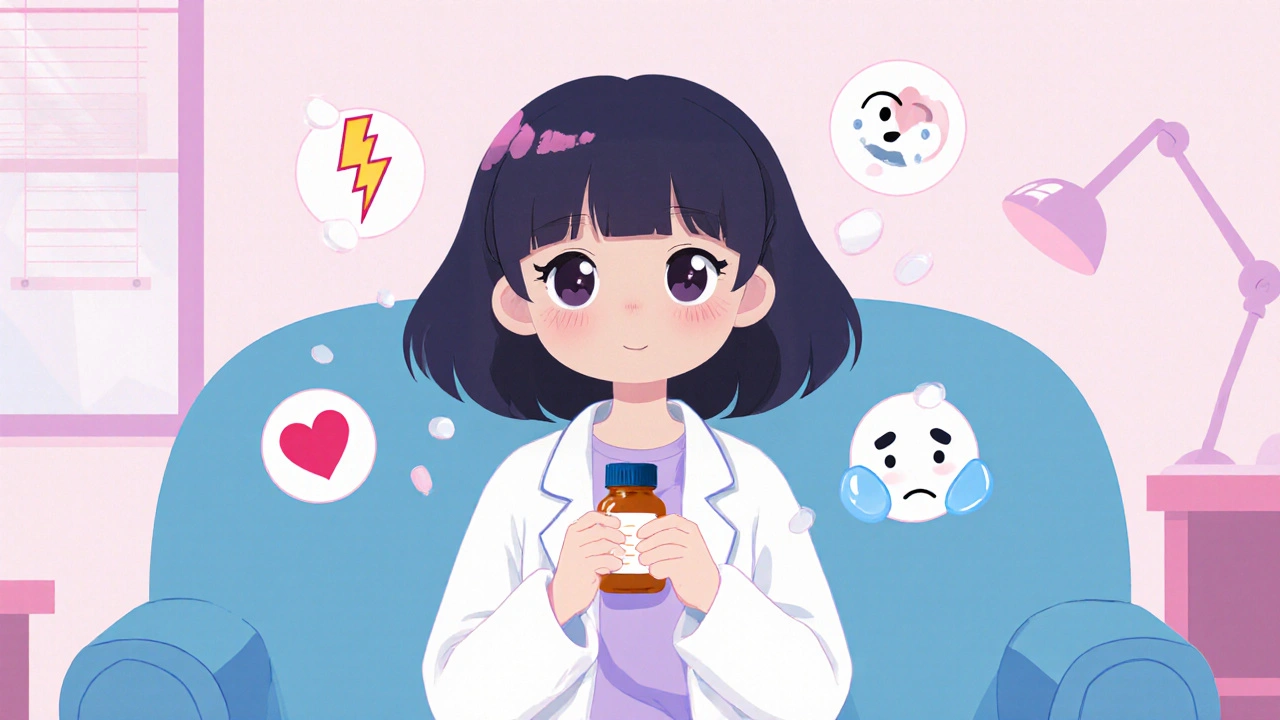Sexual side effects from common medications are more frequent than most people realize
It’s not uncommon to feel embarrassed bringing up sexual issues with your doctor - but if you’re noticing changes in your libido, erection, or orgasm after starting a new medication, you’re not alone. Thousands of people experience these side effects every year, and many don’t realize their medication is the cause. Sexual dysfunction from drugs isn’t rare. In fact, it’s one of the top reasons people stop taking their prescriptions.
Studies show that between 25% and 73% of people taking SSRIs - a common type of antidepressant - report sexual side effects. That’s more than half of users. And it’s not just antidepressants. Blood pressure pills, prostate medications, even acid reflux drugs can mess with your sex life. The problem? Most doctors don’t ask about it unless you bring it up first.
Antidepressants are the biggest culprit - but not all are the same
If you’re on an SSRI like sertraline (Zoloft), fluoxetine (Prozac), or paroxetine (Paxil), you’re at high risk. Paroxetine carries the highest risk: up to 65% of users report sexual problems. That includes low desire, trouble getting or keeping an erection, delayed or absent orgasm, and even numbness in the genitals.
Why does this happen? SSRIs increase serotonin, which helps with mood - but too much serotonin can shut down sexual response pathways in the brain and nerves. The effect is real, measurable, and often long-lasting. Even after stopping the drug, some people report lingering issues.
But here’s the good news: not all antidepressants are created equal. Bupropion (Wellbutrin) and mirtazapine (Remeron) have much lower rates of sexual side effects - sometimes close to zero. If you’re struggling with libido or orgasm, switching to one of these might be a better option than quitting your treatment entirely. Many patients find their sex life improves without losing mood stability.
Blood pressure meds can kill your sex drive - especially thiazides
High blood pressure itself can cause erectile dysfunction. But the pills used to treat it? They often make it worse. Thiazide diuretics like hydrochlorothiazide (Microzide) are the most common offenders. About 1 in 10 men taking these for heart failure report sexual problems directly linked to the drug.
Beta blockers like atenolol and metoprolol also reduce blood flow and can lower testosterone levels, leading to decreased desire and harder erections. Women on these drugs report a 41% drop in sexual desire and 34% less pleasure during sex.
But not all blood pressure meds are bad. Angiotensin II receptor blockers like valsartan have actually been shown to improve sexual desire and fantasies in women compared to beta blockers. If you’re on a blood pressure med and noticing changes, ask your doctor if switching to an ARB could help. It’s not a one-size-fits-all solution - but it’s worth exploring.

Prostate meds and antiandrogens: The trade-off no one talks about
If you’re taking finasteride (Propecia) or dutasteride (Avodart) for hair loss or an enlarged prostate, you’re at risk. Between 5.9% and 15.8% of men report lower libido. Erectile dysfunction shows up in 5.1% to 9%. And ejaculation problems? Up to 21.4% of users.
These drugs block DHT, a hormone tied to both hair growth and sexual function. The trade-off is real: you might keep your hair, but lose your sex drive. And for some men, these effects don’t go away even after stopping the drug.
For men with prostate cancer on antiandrogens like bicalutamide, sexual side effects are nearly universal - nearly all patients lose libido and struggle with erections. Some even develop breast tissue growth (gynecomastia). These are expected side effects in cancer treatment, but they still take a heavy emotional toll. Talking to a counselor or joining a support group can help more than you think.
Other surprising offenders: Epilepsy drugs, opioids, and acid reflux meds
Gabapentin and pregabalin, used for nerve pain and seizures, are linked to erectile dysfunction. They raise a protein that binds testosterone, lowering the amount your body can actually use. Opioids like oxycodone and hydrocodone are even worse. They shut down the hypothalamic-pituitary-gonadal axis - the system that controls testosterone production. Long-term users often end up with low T, fatigue, and zero sex drive.
Even proton pump inhibitors (PPIs) like omeprazole (Prilosec) and H2 blockers like ranitidine (Zantac) have been tied to reduced libido and erectile problems in some users. The mechanism isn’t fully understood, but the pattern shows up in enough case reports to be taken seriously.
What you can do - practical steps to take now
Don’t stop your meds cold. That can cause withdrawal, rebound symptoms, or worse. Instead, follow these steps:
- Talk to your doctor. Be specific: “I’ve noticed I’m not interested in sex anymore since I started this pill.”
- Ask about alternatives. For depression: switch from paroxetine to bupropion. For high blood pressure: try valsartan instead of atenolol.
- Consider dose adjustments. Sometimes lowering the dose reduces side effects without losing benefits.
- Try a “drug holiday.” Under medical supervision, taking a short break from the drug (like skipping it on weekends) can help restore sexual function.
- Timing matters. Some men find taking SSRIs after sex instead of before reduces interference with arousal.
- Don’t ignore non-drug fixes. Regular exercise improves blood flow and boosts testosterone. Studies show even 30 minutes of brisk walking five days a week helps.
For erectile dysfunction caused by SSRIs, adding sildenafil (Viagra) or tadalafil (Cialis) can work - studies show 74% to 95% of men see improvement. But this isn’t a cure. It’s a workaround. The real goal is finding a medication that doesn’t break your sex life in the first place.
Why this gets overlooked - and why you need to speak up
Doctors don’t ask about sex because they’re uncomfortable. Patients don’t bring it up because they’re embarrassed. But here’s the truth: up to 70% of people with depression already have sexual problems before even starting meds. So when a new drug causes more issues, it’s easy to blame the illness, not the medicine.
That’s a mistake. Sexual health is part of your overall health. If your medication is making you feel less like yourself - in bed or out of it - that’s a red flag. The American Urological Association now recommends routine screening for sexual side effects in patients on long-term antidepressants, blood pressure meds, or prostate drugs. You deserve that standard of care.
And if your doctor brushes you off? Get a second opinion. There are better options out there. You don’t have to choose between feeling mentally well and feeling physically alive.
What’s changing in medicine - and what’s coming next
Pharmaceutical companies are finally starting to take sexual side effects seriously. The FDA now requires drug trials to report sexual dysfunction data for CNS medications. New antidepressants are being designed to avoid serotonin overload. Some are even being tested with built-in “sexual function safeguards.”
Research is also uncovering genetic factors that make some people more sensitive to these side effects. In the future, blood tests might tell you if you’re at high risk before you even start a drug. That’s personalized medicine - and it’s coming faster than you think.
Until then, knowledge is power. If you’re on a medication and your sex life has changed, it’s not your fault. It’s not weakness. It’s pharmacology. And you have options.
Can antidepressants cause permanent sexual dysfunction?
In rare cases, yes. A small number of people report persistent sexual side effects even after stopping SSRIs - a condition sometimes called Post-SSRI Sexual Dysfunction (PSSD). While the exact mechanism isn’t fully understood, it’s believed to involve long-term changes in brain chemistry or nerve sensitivity. Most people recover within weeks or months, but if symptoms last longer than six months, consult a specialist. Don’t assume it’s just in your head - it’s documented in medical literature.
Do all blood pressure medications cause erectile dysfunction?
No. Thiazide diuretics and beta blockers are the most likely to cause problems. But angiotensin II receptor blockers (ARBs) like valsartan and losartan are less likely to affect sexual function - and in some studies, they’ve actually improved sexual desire in women. ACE inhibitors like lisinopril also have lower rates of sexual side effects. If you’re on a blood pressure med and having issues, ask your doctor if switching to an ARB or ACE inhibitor could help.
Is it safe to take Viagra with antidepressants?
Yes, for most people. Sildenafil (Viagra) and tadalafil (Cialis) are commonly prescribed alongside SSRIs to treat sexual side effects. Studies show they work in 74-95% of cases. But you must tell your doctor you’re on antidepressants - some combinations can affect blood pressure or cause dizziness. Never take Viagra with nitrates (used for chest pain), and avoid alcohol-heavy use. Always start with the lowest dose.
Can lifestyle changes fix medication-related sexual side effects?
They can help - but not always fix them. Exercise improves blood flow, boosts testosterone, and reduces stress, all of which support sexual function. Losing excess weight, quitting smoking, and reducing alcohol can make a noticeable difference. But if the drug is directly blocking nerve signals or hormone production, lifestyle alone won’t reverse it. The best approach is combining healthy habits with a medication review.
Why do some people have side effects and others don’t?
Genetics, age, overall health, and even gut bacteria play a role. Some people metabolize drugs faster or slower due to liver enzyme differences. Others have lower baseline testosterone or more sensitive nerve pathways. Women often report different side effects than men - like reduced arousal or pleasure - which can be missed in clinical trials designed around male responses. There’s no single reason, which is why personalized medicine is the future.
Should I stop my medication if I’m experiencing sexual side effects?
Never stop cold turkey. Abruptly stopping antidepressants can cause brain zaps, severe anxiety, or even seizures. Stopping blood pressure meds can spike your risk of stroke or heart attack. Always talk to your prescriber first. They can help you taper safely, switch to a better option, or add a supportive treatment. Your sexual health matters - but so does your physical safety.



Comments
This is just Big Pharma’s way of keeping us docile. They don’t care if you can’t get hard or come - they just want you to keep taking the pills. You think this is coincidence? Nope. It’s deliberate. They know if you lose your sex drive, you’ll be too tired to protest the system. Wake up, people. This isn’t medicine - it’s social control. 🤡
i think this whole thing is overblown... like, sure, some people get side effects but isnt it just because theyre too stressed? also, why do people always blame the drug? maybe its just... life? i mean, i took sertraline and my libido was fine but my cat stared at me weirdly so maybe its the cat?? 🤔
Honestly, this is one of the most practical posts I’ve read in ages. I was on Zoloft for two years and thought my low sex drive was just ‘me being depressed.’ Turns out, it was the drug. Switched to Wellbutrin - boom, libido back. Also, walking 30 mins a day helped more than I expected. You don’t need a miracle drug - just awareness and a good doc. Thanks for this.
I’m so sick of this! Americans think every problem can be fixed with a pill - and then they freak out when the pill has side effects? We’re not fragile. We’re not broken. If your sex drive drops, maybe you need to lift heavier, eat cleaner, stop scrolling TikTok for 6 hours a day - not switch meds. This is weakness dressed up as ‘health awareness.’
you are NOT alone!! i was so ashamed until i talked to my dr and she said ‘oh honey, this happens ALL THE TIME.’ switched to remeron and now i’m back to normal 😭 thank you for saying this out loud!!
Wow, a whole article about how drugs mess with your dick and nobody mentioned that 90% of these people probably just have anxiety and are projecting. ‘I can’t get hard’? Bro, maybe you’re just not attracted to your partner anymore. Or maybe you’re 42 and your testosterone’s been dropping since 2015. But sure, blame the Prozac.
This is why we need to ban SSRIs from the U.S. They’re imported from countries that don’t care about our men’s health. And why are we letting Chinese pharma companies design our antidepressants? We need American-made meds that don’t turn our sons into walking zombies with no libido. This is cultural decay.
I was SO relieved to read this. I was on Lexapro for 3 years and thought I was just ‘not a sexual person’ - turns out, I just needed Wellbutrin + a good gym routine. Now I’m dating again and actually enjoying it 😊 You’re not broken. You’re just on the wrong pill. And yes - walking helps. I did it. You can too!
as a woman of color who’s been through this - i want to say thank you. so many studies only look at white men. i had zero libido on metoprolol and no one even asked if it was the med. i switched to losartan and it was like a light turned on. also, exercise didn’t fix it alone - but the med change did. you’re not imagining it. your body is speaking. listen.
The real issue here is the lack of systemic integration of sexual health metrics into routine pharmacovigilance. We’re operating in a paradigm where libido is treated as a tertiary endpoint - when it should be primary. The HPG axis disruption isn’t ‘a side effect’ - it’s a pharmacodynamic signature. We need biomarker-driven prescribing. And stop calling it ‘embarrassing.’ It’s physiology.